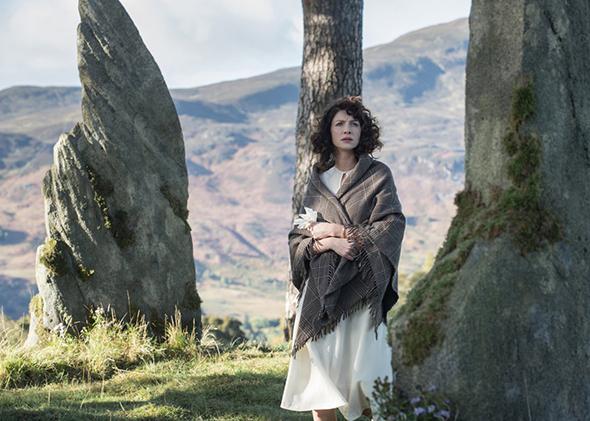When Game of Thrones first premiered, the New York Times’ Ginia Bellafante dismissed the show as “boy-fiction,” an intended insult to the series that was widely interpreted as a knock on women, many of whom were already fans of George R.R. Martin’s books. Why is the detailed realpolitik fantasy of Game of Thrones assumed to be guy stuff? Why gender-essentialize taste? The ratings bore out the complaints: Forty-two percent of Game of Thrones audience is female. Never let it be said that women don’t like swords and sorcery.
This Saturday night, Starz premieres another series based on beloved books that features swords, unshowered men, and dabs of magic, and yet no one would ever call it, misguidedly or otherwise, “boy-fiction.” The show in question is the time-skipping drama Outlander, adapted by Battlestar Galactica’s Ronald D. Moore from Diana Gabaldon’s series of books, which you can call romance novels if you are trying to infuriate someone. In the series, as the books, married British nurse Claire Randall (Caitriona Balfe) touches a sacred monolith and falls back in time from the postwar 1940s to the Scottish Highlands of the 1700s, when the Scottish clans are just a few short years from a final faceoff with the British.
In the run-up to the show’s premiere, there has been some debate about whether it can appeal not just to women, but to men. It, after all, stars a woman, is told from a woman’s point of view, and features none of the casual male gaze of Game of Thrones: The only chest being ogled here is a dashing young Scotsman’s. Sure, women will watch swords and dragons, the thinking now goes. It’s not at all clear men will watch love stories featuring a female protagonist.
Starz and Moore are doing everything they can to fight that conception. One writer criticized the gauzy opening credits for being “hardcore Ren-meets-Lilith Fair,” but, credits aside, the show actively courts the male viewers Starz believes it needs to court. The political intrigue is amped up and the romance downplayed, at least early on. Starz chief Chris Albrecht told BuzzFeed, “The female audience for Outlander is there. Now we’re simply expanding that fan base [to include men].”
I wish they wouldn’t.
The best moment in the premiere is distinctly female-centric. It arrives as Claire and her husband, Frank (Tobias Menzies), get busy in the ruins of a Scottish castle. Having pushed their way into a dark, overgrown room deep within the castle, the two wonder what the room was once used for and get to slightly suggestive talk. Claire flashes her garters at her husband, who observes, “Why, Mrs. Randall, I do believe you’ve left your undergarments at home.” Then he goes down on her.
Crass as it may sound, this sequence is an encapsulation of the promise of Outlander. It is a scene which there is no nudity, but it immediately announces the show’s focus and priorities as distinct from other history-heavy fantasies. It’s more feminine than Game of Thrones and more outré than Downton Abbey. It’s a series that pays attention to the pleasure of female characters, and that is uniquely focused on the pleasures of female viewers.
But this scene is also, alas, a bit of tease. Anne Helen Petersen, praising the series for BuzzFeed, begins by remarking on just how “hot” the sex scenes in the book were; I’ve never read the books, but a whole lot of friends have told me the same thing. Before I had seen the show, another friend informed me that though she wasn’t sure it was very good, Claire’s Scottish love interest, a very, very strapping young man named Jamie (Sam Heughan), was so cute she couldn’t stop watching. All to say, before I began watching, I was hoping that Outlander would go heavy on the romance. But through the first six episodes, the only thing it goes heavy on is Highlands history.
Claire, upon being cast back in time shortly after her dalliance with her husband, is quickly discovered by members of the Clan MacKenzie. Plucky and outspoken, Claire claims to be an Englishwoman trying to return to her family, but the MacKenzies are suspicious that she is a British spy. Without treating her badly, they refuse to let her leave. As Claire plots to get back to the monolith and her own time—in voiceover after voiceover—she begins to make a place among the Scots, and get close to Jamie, a kind, handsome horse trainer who is wanted by the British army. Claire’s work as a wartime nurse allows her to become the MacKenzies’ healer, a position that helps her eventually recognize and sympathize with the Scots’ Jacobite loyalties.
As a show trying to scratch the same itch as Game of Thrones, Outlander is at a disadvantage. It just is not as robust as Game of Thrones: Its story would be just one of Game of Thrones’ very many. In some ways, this sounds promising—so many storylines on Game of Thrones are given short shrift—but Outlander lacks Game of Thrones’ moral complexity. Claire may be British, but the show’s loyalties are all with the Scots. The early episodes are a mix of lesser world-building and sometimes dull, sometimes trite, sometimes appealing fish-out-of-water tales as Claire’s knowledge of the future gets her into and out of scrape after scrape.
Having seen six episodes of the 16-episode season, however, I am not ready to give up on the possibility that Outlander will become the feminist romance in it-appeals-to-men-too clothing of my dreams. At the end of the sixth episode, the best and most dramatically taut of the bunch, Claire tells Jamie, for reasons I won’t spoil, that she hopes he won’t be upset that she is not a virgin. Jamie stands up in his kilts, smiles, and tells her he is not, so long as she won’t be upset that he is one. Dear laird, the possibilities made me blush.
